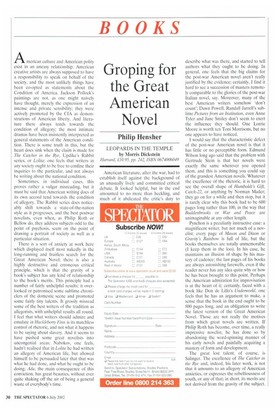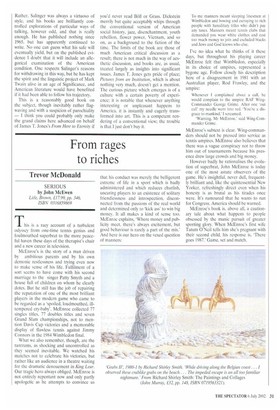Groping for the Great American Novel
Philip Hensher
LEOPARDS IN THE TEMPLE by Morris Dickstein
Harvard, £10.95, pp. 242, ISBN 0674006049
American culture and American polity exist in an uneasy relationship. American creative artists are always supposed to have a responsibility to speak on behalf of the society, and the most unlikely things have been co-opted as statements about the Condition of America. Jackson Pollock's paintings are not, as one might naively have thought, merely the expression of an intense and private sensibility; they were actively promoted by the CIA as demonstrations of American liberty. And literature there always tends towards the condition of allegory; the most intimate dramas have been insistently interpreted as general statements of the American condition. There is some truth in this, but the heart does sink when the claim is made for The Catcher in the Rye, Updike's Rabbit series, or Lofirci; one feels that writers in any society ought to be free to confine their inquiries to the particular, and not always be writing about the national condition.
Sometimes, in individual cases, this proves rather a vulgar misreading, but it must be said that American writing does of its own accord tend towards the condition of allegory. The Rabbit series does noticeably shift towards a state-of-the-nation style as it progresses, and the best postwar novelists, even when, as Philip Roth or Bellow do, they address subjects odd to the point of psychosis, seem on the point of drawing a portrait of society as well as a particular situation.
There is a sort of anxiety at work here which displayed itself most nakedly in the long-running and fruitless search for the Great American Novel; there is also a highly destructive and erroneous critical principle, which is that the gravity of a hook's subject has any kind of relationship to the hook's merits. This principle had a number of fairly unhelpful results; it overlooked or patronised some sublime chroniclers of the domestic scene and promoted some fairly tiny talents. It grossly misread some of the best writers of the tradition as allegorists, with unhelpful results all round. I feel that what writers should admire and emulate in Huckleberry Finn is its matchless control of rhetoric, and not what it happens to he saying about slavery. And it seems to have pushed some great novelists into uncongenial areas: Nabokov, one feels, hadn't realised that in Lolita he had written an allegory of American life, but allowed himself to be persuaded later that that was what he had done, and what he ought to be doing; Ada, the main consequence of this conviction, has great beauties, without ever quite shaking off the air of being a general waste of everybody's time. American literature, after the war, had to establish itself against the background of an unusually lively and committed critical debate. It looked helpful, but in the end amounted to no more than heckling, and much of it abdicated the critic's duty to describe what was there, and started to tell authors what they ought to be doing. In general, one feels that the big claims for the post-war American novel aren't really justified by the evidence; certainly, I find it hard to see a succession of masters remotely comparable to the glories of the post-war Italian novel, say. Moreover, many of the best American writers somehow 'don't count'; Dawn Powell, Randall Jarrell's sublime Pictures from an Institution, even Anne Tyler and Jane Smiley don't seem to exert the influence they should. One Lorrie Moore is worth ten Toni Morrisons, but no one appears to have noticed.
I would say that the characteristic defect of the post-war American novel is that it has little or no perceptible form. Edmund Wilson long ago said that the problem with Gertrude Stein is that her novels were exactly the same wherever you opened them, and this is something you could say of the grandest American novels, Whatever the excellence of the rhetoric, it is hard to see the overall shape of Humboldt's Gift, Catch-22, or anything by Norman Mailer; they go on for a while and then stop, but it is rarely clear why this book had to be 600 pages long rather than 100, in the way that Buddenbrooks or War and Peace are unimaginable at any other length.
Pynchon is a peculiarly instructive case: a magnificent writer, but not much of a novelist; every page of Mason and Dixon or Gravity's Rainbow is full of life, but the books themselves are totally unmemorable (I keep them in the loo). In his case, he maintains an illusion of shape by his mastery of cadence; the last pages of his books are always astonishing farewells, even if the reader never has any idea quite why or how he has been brought to this point. Perhaps the American admiration for improvisation is at the heart of it; certainly, faced with a book like Don de Lillo's Underworld, one feels that he has an argument to make, a sense that the book in the end ought to be 800 pages long, and an obligation to write the latest version of the Great American Novel. Those are not really the motives from which great novels are written. If Philip Roth has become, over time, a really impressive novelist, he has done so by abandoning the word-spinning manner of his early novels and painfully acquiring a mastery of form and development.
The great lost talent, of course, is Salinger. The excellence of The Catcher in the Rye and, indeed, his later work, is not that it amounts to an allegory of American anxieties, or expresses the rebelliousness of youth, or any of that; in short, its merits are not derived from the gravity of the subject. Rather, Salinger was always a virtuoso of style, and his books are brilliantly controlled explorations of particular ways of talking, however odd, and that is really enough. He has published nothing since 1965, but has apparently continued to write. No one can guess what his safe will eventually yield, but on the published evidence I doubt that it will include an allegorical examination of the American condition. One respects Salinger's reasons for withdrawing in this way, but he has kept the spirit and the linguistic project of Mark Twain alive in an age of Significance, and American literature would have benefited if it had been able to follow his trajectory.
This is a reasonably good book on the subject, though inevitably rather flagwaving and with a suspicion of parochiality — I think you could probably only make the grand claims here advanced on behalf of James T. Jones's From Here to Eternity if
you'd never read B011 or Grass. Dickstein merrily but quite acceptably whips through the conventional version of American social history, jazz, disenchantment, youth rebellion, flower power, Vietnam, and so on, as a background to the fiction of the time. The limits of the book are those of much American critical discussion as a result; there is not much in the way of aesthetic discussion, and books arc, as usual, treated largely as insights into significant issues. James T. Jones gets pride of place; Pictures from an Institution, which is about nothing very much, doesn't get a mention. The curious picture which emerges is of a culture with a certain poverty of experience; it is notable that whenever anything interesting or unpleasant happens to America, it is instantly and eagerly transformed into art. This is a competent rendering of a conventional view; the trouble is that I just don't buy it. To me manners meant sleeping linesmen at Wimbledon and bowing and curtsying to rich people with hereditaiy titles who didn't pay any taxes. Manners meant tennis clubs that demanded you wear white clothes and cost too much money to join and excluded blacks and Jews and God knows who else.
I've no idea what he thinks of it these days, but throughout his playing career McEnroe felt that Wimbledon, especially in its choice of umpires, represented a bygone age. Follow closely his description here of a disagreement in 1981 with an Australian player, Rod Frawley, and the umpire:
Whenever I complained about a call, he would complain to the umpire RAF WingCommander George Grime. After one out call' my needle went into red. 'You're a disgrace to mankind,' I screamed.
'Warning, Mr McEnroe,' said Wing-Commander Grime.
McEnroe's subtext is clear. Wing-commanders should not be pressed into service as tennis umpires. McEnroe also believes that there was a vague conspiracy not to throw him out of tournaments because his presence drew large crowds and big money.
However badly he rationalises the evolution of superbrat, John McEnroe is today one of the most astute observers of the game. He's insightful, never dull, frequently brilliant and, like the quintessential New Yorker, refreshingly direct even when his honesty is as brutal as his tirades once were. It's rumoured that he wants to run for Congress. America should he warned.
McEnroe's book is, above all, a cautionary tale about what happens to people obsessed by the manic pursuit of greater sporting glory. When McEnroe's first wife Tatum O'Neil tells him she's pregnant with their second child, his response is, 'There goes 1987.' Game, set and match.



























































 Previous page
Previous page